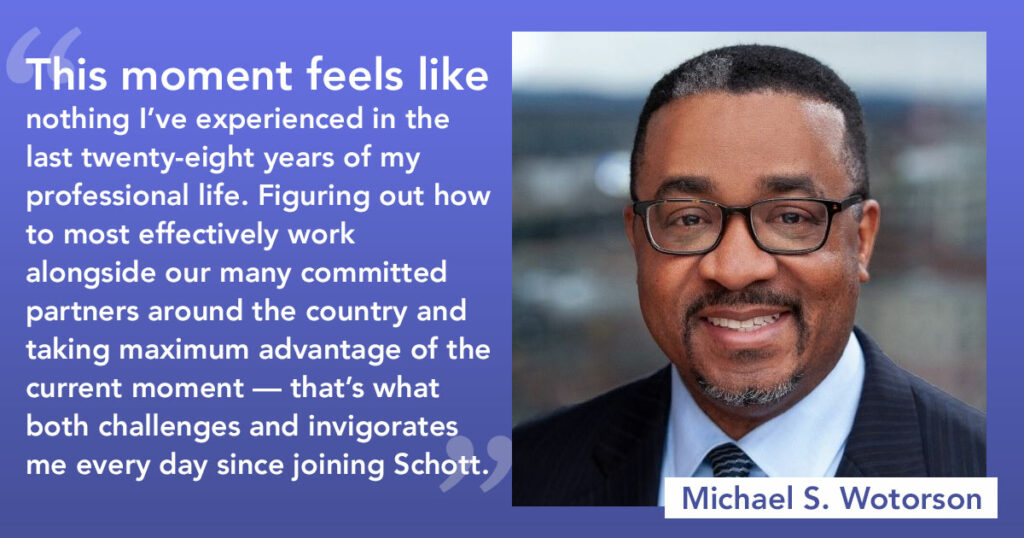Blog
“This Moment Feels Like Nothing I’ve Experienced”: Michael S. Wotorson on the Challenge and Opportunity of Education Justice

Michael S. Wotorson recently joined the Schott Foundation for Public Education as our new Director of the National Opportunity to Learn Network. A longtime advocate and funder in the racial justice space, we asked him what he thinks of the present moment and what he sees for the future.
What prompted your move to Schott and how do you see your work evolving at Schott Foundation? What lessons are you bringing with you from your time at the Hartford Foundation for Public Giving?
I was drawn to the Schott Foundation because of its history of supporting grassroots voices and elevating the dialogue around equity and educational justice. Having worked in both policy and direct advocacy spaces over the course of my career, I am excited to foster the new momentum fueled by the authentic education justice movement supported by Schott. I am particularly excited at the chance to shift the conversation about educational justice through the evolving work of our National Opportunity to Learn Network.
Having spent time at a community foundation like the Hartford Foundation, I’ve gained a deep appreciation for the value of meaningfully connecting community voice to municipal and state decisional structures. I’ve been able to participate first-hand in directing resources toward elevating those voices for transformative impact. I see these as important elements for my work at Schott.
You’ve been at Schott Foundation for more than a month now, what are some of the things that have surprised or challenged you?
We are in a deeply opportune moment right now around national policy and much of that has been the result of tensions and pressures this country has endured over the last six to eight years. What has consumed my attention the most since joining Schott is the clear opportunity for all of us progressive education justice advocates. Many communities are convulsing with a real desire to engage in open, fact-based, and change-oriented conversations.
This moment feels like nothing I’ve experienced in the last twenty-eight years of my professional life. Figuring out how to most effectively work alongside our many committed partners around the country and taking maximum advantage of the current moment — that’s what both challenges and invigorates me every day since joining Schott.
A lot of your work over the past few years has been focused on promoting racial justice and civil rights, especially in schools and BIPOC communities. What can grassroots organizations and funders learn from the history of the First and Second Reconstructions, as momentum builds for a Third? How does grassroots community power translate into lasting policy?
It’s clear to me that Americans came to empathize with the volume of discrimination, disenfranchisement, and, frankly, death visited upon communities of color following the First and Second Reconstructions. I think this created a real basis for engaging in collective action to promote reconciliation, healing, and rebuilding.
At the same time, however, there was also a racialized reaction that led many to believe their rights were suddenly being curtailed as those benefiting communities of color grew. We seem to be in a similar moment today, particularly stoked by the increasingly far-right and anti-democratic voices that have found platforms in recent years.
The reality is, though, that our rights are all entirely interdependent. Our democracy therefore cannot survive and thrive unless we take full advantage of this reconstructive moment and restructure the educational enterprise around principles of justice. Paulo Freire was right when he argued that “there is no such thing as neutral education. Education either functions as an instrument to bring about conformity or freedom.”
Shifting power to realign our national dialogue toward justice is what our grassroots community leadership can do best. Our challenge and responsibility must be to provide resources and space for those grassroots leaders to strengthen and grow their impact.


